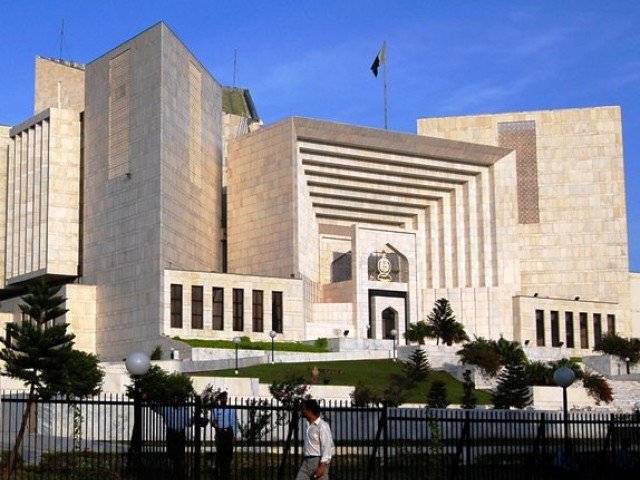ISLAMABAD - The Supreme Court on Tuesday assured that absconding former military ruler General (R) Pervez Musharraf would be provided foolproof security of rangers and medical treatment by the doctors of his own choice on his arrival to Pakistan.
The top court, while observing that submission of complete details of Pakistan People’s Party Co-chairman Asif Ali Zardari, his late wife Benazir Bhutto and children could not be termed as trial on grave, also directed Zardari to provide details of assets he inherited from his late wife.
A 3-judge bench headed by Chief Justice Mian Saqib Nisar and comprising Justice Umar Ata Bandial and Justice Ijazul Ahsan took up the case for hearing regarding a petition filed by Syed Feroze Gillani requesting the top court for a ruling to compensate all the losses and damages suffered by the national exchequer in the backdrop of National Reconciliation Ordinance (NRO) 2007, including the loss of $60 million in the Swiss Banks representing illegal funds acquired through corruption and money laundering by Zardari
During the course of the hearing, the chief justice also observed that Musharraf’s Chak Shehzad farmhouse will also be de-sealed for his residence.
When the hearing commenced, Advocate Akhtar Shah representing Pervez Musharraf submitted details of his client’s assets and said that the former military ruler owned no asset in Pakistan. He said that his client owned an apartment in Dubai whose worth was AED 5.4 million while a farmhouse situated in Chak Shehzad was owned by Musharraf’s wife.
On court’s query, the counsel said that the farmhouse comprised of 4 to 5 acres of land and its cost was Rs40.3 million.
The chief justice observed that why Musharraf was not coming back to Pakistan, adding that he was absconder and was being tried under Article 6. Whether the law is different for your client, chief justice asked Musharraf’s counsel, adding that Musharraf was seen enjoying parties while he cited his ailment in Pakistan.
The counsel responded that his client had full confidence in Pakistani courts and he wanted to return to Pakistan but there were certain concerns which were hindering him to land in Pakistan.
The first issue, the counsel said, is security and the second issue is his medical treatment and the other issue is that there was no place for him to live in.
The chief justice, however, assured that his client would be provided rangers’ security from the airport and medical treatment by the doctors of his own choice. The chief justice also referred to the doctors of AFIC or CMH for treatment of Musharraf, saying that he could opt for doctors of his own choice.
The chief justice further remarked that the farmhouse will be de-sealed on arrival of Musharraf.
During the hearing, chief justice also made it clear that the top court had not issued orders for deletion of Musharraf’s name from ECL. He further remarked that Sindh High Court had issued orders for placing the name in ECL but government itself deleted the name.
The chief justice told the counsel for Musharraf that his client should express confidence in the courts not verbally but by conduct.
The counsel requested the top court to ensure no bound on travel of Musharraf abroad again after returning to Pakistan.
The chief justice responded that he must come and face the trial and if he was acquitted from the courts, then he could live wherever he wanted to.
During the course of hearing, Zardari’s Counsel Farooq H Naek told the bench that a private person could not be summoned under the Article 184 (3), under which the case is adjudicated.
The chief justice observed that his client could be summoned as the matter regarding losses suffered by national exchequer in the backdrop of NRO 2007 was public money, adding that it was the case of fundamental rights. Justice Ahsan observed that Zardari was not a private person and he had been president and public office holder.
Naek contended that his client had been acquitted in 8 different cases, adding that his client’s wife was deceased and children were not dependent on father, Zardari. Justice Ahsan observed that this was an opportunity for Zardari to redeem himself.
Naek contended that seeking details of his client’s deceased wife was trial on her grave. Chief justice, however, remarked that mere information regarding assets was not trial on grave. But Naek contended that he was not aware what would happen in this case in future, adding such orders were tantamount to trial on Shaheed Benazir Bhutto’s grave.
The chief justice told Zardari’s counsel that murderers’ trial of Benazir Bhutto’s assassination was not conducted even in Zardari’s tenure and that his government should have prosecuted the case.
On this, Sardar Latif Khosa, who was present in the court room, raised from his seat and regretfully complained to chief justice that applications against suspension of accused person’s convictions had been pending in the top court since long.
Chief justice told Khosa to file an early hearing application for the purpose and the same will be fixed soon.
During the hearing, Justice Bandial was visibly convinced with the arguments of Naek regarding details of assets would be trial on Bhutto’s grave. “We accept your stance. We will consider your (Naek’s) point,” said Justice Bandial.
Later, the case was adjourned for 15 days after bench altered its earlier August 29 order, which had sought details of foreign assets belonging to Asif Zardari, Benazir Bhutto and her children.
The top court while adjourning the case directed Zardari and children to submit details of assets which they inherited from Shaheed Benazir Bhutto.






